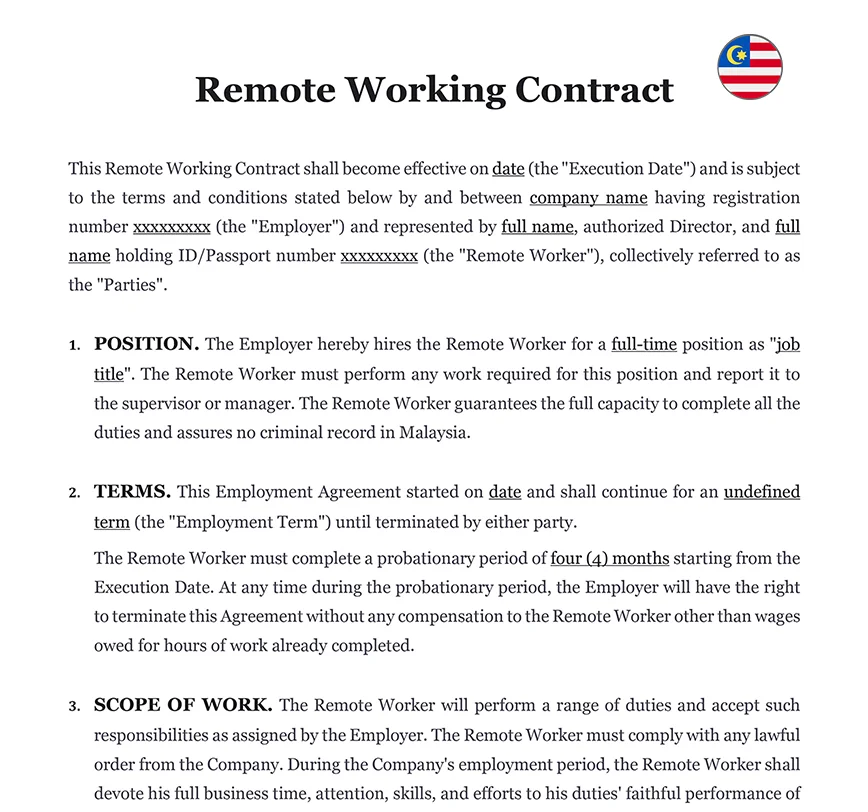Ready to use legal template
Drafted by experienced lawyers
Compliant with Hong Kong law
Ready to use legal template
Drafted by lawyers
Compliant with Hong Kong law
Learn more about Remote Working Contract in Hong Kong
A Remote Working Contract is a legally binding agreement between an employer and an employee that outlines the terms and conditions for working remotely. It defines the employee’s duties, working hours, compensation, and other relevant aspects of remote work, ensuring clarity for both parties. As remote work becomes increasingly popular, having a formal contract is essential to avoid misunderstandings and ensure compliance with Hong Kong’s labor laws. This contract can address issues such as equipment provision, data security, performance expectations, and work-life balance, offering both protection and flexibility. Whether you are transitioning to a remote work model or formalizing an existing arrangement, a Remote Working Contract ensures legal clarity and peace of mind. Download our easy-to-edit Remote Working Contract in Word format, drafted by legal experts specifically for use in Hong Kong.
Table of contents
-
What is a Remote Working Contract in Hong Kong?
-
What is included in this Remote Working Contract?
-
Is a Remote Working Contract legally binding in Hong Kong?
-
How should work hours be defined in a Remote Working Contract?
-
Can a Remote Working Contract include performance expectations?
-
How does a Remote Working Contract differ from an employment contract?
-
How does a Remote Working Contract handle confidentiality?
-
How can a Remote Working Contract address data security?
-
What are the tax implications for remote workers in Hong Kong?
What is a Remote Working Contract in Hong Kong?
A Remote Working Contract in Hong Kong is a legally binding agreement between an employer and an employee that outlines the terms and conditions for working remotely. This contract specifies the employee’s duties, working hours, compensation, and other relevant aspects of remote work, ensuring clarity for both parties. As remote work becomes increasingly popular, having a formal contract is essential to avoid misunderstandings and ensure compliance with Hong Kong’s labor laws. This contract can address issues such as equipment provision, data security, performance expectations, and work-life balance, offering both protection and flexibility.
What is included in this Remote Working Contract?
A well-drafted Remote Working Contract in Hong Kong should encompass the following clauses to ensure clarity and legal compliance:
| ➤ Position: This clause outlines the job title and responsibilities of the Remote Worker, confirming their commitment to perform tasks as per the employer’s expectations, ensuring full compliance with Hong Kong labor laws. |
| ➤ Terms: Specifies the commencement date of employment and the duration of the agreement, detailing any probationary period and conditions for termination during this period, aligned with Hong Kong’s employment regulations. |
| ➤ Scope of Work: Defines the tasks and responsibilities the Remote Worker must undertake, ensuring they align with Hong Kong’s fair employment practices and the company’s business needs, with a focus on independent work and use of technology. |
| ➤ Work Schedule: Outlines standard working hours, breaks, and flexibility requirements, ensuring compliance with Hong Kong’s labor laws on work hours, rest periods, and overtime pay, if applicable. |
| ➤ Salary: Specifies the monthly salary to be paid to the Remote Worker, ensuring the amount complies with Hong Kong’s minimum wage and compensation standards. |
| ➤ Benefits: Details the benefits the Remote Worker is entitled to, such as commissions, bonuses, allowances, and insurance, while also considering Hong Kong’s social security contributions and employee benefits regulations. |
| ➤ Performance Evaluation: Establishes the frequency and criteria of performance evaluations to assess the Remote Worker’s progress and contributions, adhering to Hong Kong’s standards for employment reviews and feedback processes. |
| ➤ Communication and Collaboration: Highlights the expected communication methods and tools to be used for remote collaboration, ensuring compliance with Hong Kong’s data protection and remote work communication standards. |
| ➤ Equipment and Technology: Ensures the employer provides necessary work-related technology and tools while emphasizing the Remote Worker’s responsibility to safeguard equipment, in compliance with Hong Kong’s occupational health and safety guidelines. |
| ➤ Data Security and Confidentiality: Sets out the obligations of the Remote Worker to maintain confidentiality and protect sensitive company data, in accordance with Hong Kong’s data protection laws and regulations. |
| ➤ Vacation: Specifies the Remote Worker’s entitlement to annual leave, sick leave, and other forms of leave, ensuring the terms meet Hong Kong’s statutory leave requirements. |
| ➤ Expenses: Ensures that work-related expenses incurred by the Remote Worker are reimbursed according to company policies, with adherence to Hong Kong’s tax and accounting standards for business expenses. |
| ➤ Termination: Outlines the conditions for termination, including notice periods and provisions for termination due to breach, in compliance with Hong Kong’s Employment Ordinance. |
| ➤ Entire Agreement: Confirms that the agreement constitutes the full understanding between the employer and Remote Worker, superseding any previous oral agreements or understandings, ensuring clarity and legal validity under Hong Kong law. |
| ➤ Governing Law: Clarifies that the Remote Working Contract will be governed by the laws of Hong Kong, ensuring the agreement adheres to local legal requirements and employment protections. |
ℹ️ The Employment Contract outlines the official agreement between the employer and employee, ensuring clarity on roles, responsibilities, and legal obligations, which is crucial when defining remote work arrangements.
Is a Remote Working Contract legally binding in Hong Kong?
1. Legality of Remote Working Contracts
Yes, a Remote Working Contract is legally binding in Hong Kong, provided that it meets the standard requirements of a valid contract. This includes mutual consent, lawful consideration, and clear terms that define the rights and obligations of both parties. While Hong Kong law does not explicitly mandate that employment contracts must be written, having a written agreement is highly beneficial. A remote working contract should clearly outline key elements such as job duties, work hours, compensation, and any remote-specific conditions, making it easier to avoid disputes and ensuring that the terms are enforceable in case of disagreements.
2. Importance of a Written Agreement
Though not required by law, a written contract for remote work in Hong Kong offers significant legal advantages. A well-drafted document helps clarify expectations and responsibilities for both the employer and the employee. It ensures that both parties are on the same page regarding work arrangements, confidentiality, data protection, and other specific conditions related to remote work. Additionally, having a written contract is essential for protecting both parties’ rights and provides evidence in case of legal issues or disputes. It is highly advisable to formalize remote work arrangements in writing to ensure transparency and security for both sides
How should work hours be defined in a Remote Working Contract?
1. The Importance of Written Resignation
Although you can technically resign verbally or through informal means, it is strongly advised to submit a written resignation. A written resignation serves as a clear, formal record of your decision to leave the company. This avoids any ambiguity that may arise in the future regarding your intent. Employers typically require a written notice before processing your final paycheck or starting the exit procedures. A clear, documented resignation also helps to ensure that the process proceeds smoothly and professionally without confusion or delays. In some cases, failure to submit a written resignation may lead to misunderstandings or complications during the termination process.
2. Protection Against Disputes
Having a signed, written resignation letter provides valuable protection in case a dispute arises about the nature of your departure. If there is any question as to whether you resigned voluntarily or were terminated, the written resignation offers proof of your intent. It serves as clear evidence that the decision to leave was yours, which can protect you from potential legal claims or misunderstandings. Without such documentation, the employer may claim that your departure was not voluntary, which could complicate matters related to severance, benefits, or future employment references.
Can a Remote Working Contract include performance expectations?
Including performance expectations in a Remote Working Contract is essential to ensure accountability, maintain productivity, and align with legal and business standards. Clear goals, KPIs, and evaluation processes are key elements to consider for both employers and employees.
| ➤ Clear Goals and Objectives: Set specific goals that employees are expected to achieve, helping to define their success. |
| ➤ Key Performance Indicators (KPIs): KPIs should be defined to measure employee performance, productivity, and overall outcomes. |
| ➤ Evaluation Process: Outline the evaluation process for assessing performance, ensuring fairness and transparency. |
| ➤ Regular Performance Reviews: Schedule regular performance reviews to provide feedback, track progress, and address any issues. |
| ➤ Compliance with Local Standards: Ensure performance evaluation aligns with Hong Kong’s employment review standards, fostering a transparent and consistent approach. |
ℹ️ The Employee Performance Evaluation section is a critical component of the Remote Working Contract, as it sets clear performance expectations and provides a structure for assessing the employee’s progress and contributions to the company.
- Remarks:
Performance expectations must be clearly defined in the Remote Working Contract to ensure transparency and fairness. Both parties should agree on measurable goals, KPIs, and evaluation processes to prevent any misunderstanding. Non-compliance with these standards may result in disputes over performance reviews or terminations.
How does a Remote Working Contract differ from an employment contract?
1. Key Elements of a Remote Working Contract
A Remote Working Contract includes the standard employment terms but is customized to address the unique aspects of working remotely. These contracts typically outline the expectations regarding communication, including the frequency and modes of contact (e.g., video calls, emails, and instant messaging). Employers may also specify which equipment, such as computers, software, and other tools, will be provided or reimbursed. The agreement ensures that both parties are clear about how work should be conducted, where it should be completed, and when employees are expected to be available, helping prevent misunderstandings.
2. Data Security and Remote Work Policies
A key focus of a Remote Working Contract is ensuring that proper data security measures are in place. This includes outlining policies for the secure handling of confidential information, the use of encryption tools, and adherence to relevant data protection regulations. Additionally, remote work policies within the contract help manage issues such as work-life balance, time tracking, and compliance with legal requirements for remote workers. These policies are critical for maintaining productivity and security in a remote working environment, ensuring both employer and employee understand their roles in protecting company assets. For more details, refer to the Hong Kong Labour Department.
How does a Remote Working Contract handle confidentiality?
1. Confidentiality in Remote Working Contracts
Confidentiality is a vital aspect of any Remote Working Contract, especially when it comes to protecting company information, trade secrets, and client data. The contract should contain specific clauses that require the remote worker to maintain strict confidentiality throughout their employment and even after termination. These clauses should outline the methods for handling sensitive information, restrictions on unauthorized disclosures, and the consequences in case of breaches. By including these provisions, the employer ensures that the worker understands their obligation to safeguard confidential data and comply with applicable legal standards.
2. Compliance with Data Protection Laws
In addition to confidentiality clauses, the contract should highlight the importance of adhering to Hong Kong’s data protection laws, including the Personal Data (Privacy) Ordinance. The remote worker must be made aware of their responsibilities in managing client and employee data securely and preventing unauthorized access or misuse. Breaches of these data protection laws can result in legal penalties for both the employee and the employer. For further details on privacy and data protection, refer to the Hong Kong Privacy Commissioner for Personal Data.
ℹ️ The Employee Confidentiality Agreement is essential for ensuring that sensitive company information remains protected, particularly when employees are working remotely and accessing confidential data from various locations.
How can a Remote Working Contract address data security?
Data security is a critical aspect of remote work. A well-drafted Remote Working Contract should clearly outline the responsibilities of remote workers in safeguarding company data. This ensures that employees understand their obligations and helps protect the company’s sensitive information. Below are the key points related to data security in such contracts.
| ➤ Remote Worker Responsibilities: The contract should specify the worker’s duty to safeguard company data, including secure data handling practices. |
| ➤ Secure Networks: Workers must use secure networks (e.g., VPNs) when accessing company data remotely. |
| ➤ Approved Software & Tools: Employees should only use company-approved software and tools to access or manage sensitive information. |
| ➤ Password Management: The contract should require regular password updates and the use of strong, unique passwords. |
| ➤ Reporting Security Breaches: Employees must agree to promptly report any security breaches or suspicious activities. |
| ➤ Employer Support: Employers should offer training and resources to help employees maintain data security, in line with Hong Kong’s data protection regulations. |
- Remarks:
Data security provisions must be outlined in detail to ensure remote workers handle company information responsibly. The contract should address secure access protocols, reporting of breaches, and the use of company-approved tools. Employers should provide adequate training to remote workers to meet data security requirements and avoid legal and financial risks.
What are the tax implications for remote workers in Hong Kong?
1. Tax Obligations for Remote Workers in Hong Kong
For remote workers based in Hong Kong, income is generally subject to Hong Kong’s salaries tax, and employers are required to make the necessary tax deductions. Additionally, contributions to the Mandatory Provident Fund (MPF) are mandatory for both the employer and employee, ensuring that workers are saving for retirement. It is essential for employers to adhere to these regulations to avoid penalties and ensure proper tax compliance. Employers must also be aware of their obligations to provide accurate tax filings for remote workers, similar to in-office employees.
2. Remote Workers Outside Hong Kong
For remote workers who are based outside Hong Kong, the tax obligations depend on the worker’s country of residence. Tax rates and regulations may vary significantly from country to country, and employers must consult with tax professionals to understand how these international laws apply. Additionally, double taxation agreements between Hong Kong and other countries can impact tax liability, potentially reducing the risk of double taxation. Employers should ensure that they follow both local and international tax laws to maintain compliance. For more information, visit Hong Kong Inland Revenue Department.
Conclusion
A Remote Working Contract is an essential document for any employer-employee relationship that extends beyond the traditional office environment. In Hong Kong, where labor regulations are both clear and employee-friendly, such a contract ensures legal compliance while fostering transparency and mutual accountability. By clearly outlining job responsibilities, working hours, salary, benefits, data security, and termination terms, the contract protects both parties and reduces the risk of disputes. Incorporating clauses that address local legal standards such as those related to minimum wage, statutory leave, and the Employment Ordinance ensures that remote work remains fair, efficient, and sustainable. Whether you’re an employer looking to formalize remote arrangements or an employee seeking clarity on your rights and obligations, having a comprehensive Remote Working Contract is a necessary step toward a professional and productive remote work experience in Hong Kong.
SPECIAL OFFER
HR Pro
15 Document Package
Essential documents for managing employees in Malaysia
Remote Working ContractTemplate (.docx)
Save on attorney fees
310 client reviews (4.8/5) ⭐⭐⭐⭐⭐
Share information
Why Themis Partner ?
Make documents forhundreds of purposes
Hundreds of documents
Instant access to our entire library of documents for Hong Kong.
24/7 legal support
Free legal advice from our network of qualified lawyers.
Easily customized
Editable Word documents, unlimited revisions and copies.
Legal and Reliable
Documents written by lawyers that you can use with confidence.




